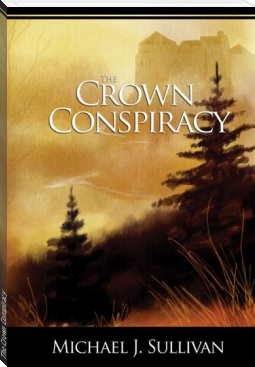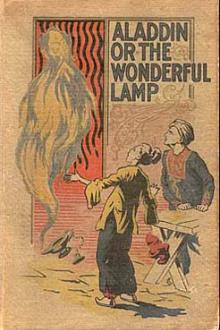Figures of Earth: A Comedy of Appearances by James Branch Cabell (best reads .TXT) 📗

- Author: James Branch Cabell
Book online «Figures of Earth: A Comedy of Appearances by James Branch Cabell (best reads .TXT) 📗». Author James Branch Cabell
Thereafter Misery went about the heathens' paradise in the appearance of a light formless cloud. And the fields of this paradise seemed less green, the air became less pure and balmy, and the sky less radiant, and the waters of the paradisal river Eridanus grew muddy. The poets became tired of hearing one another recite, the heroes lost delight in their wrestling and chariot racing and in their exercises with the spear and the bow. "How can anybody expect us to waste eternity with recreations which are only fitted to waste time?" they demanded.
And the lovely ladies began to find the handsome lovers with whom they wandered hand in hand through never-fading groves of myrtle, and with whom they were forever reunited, rather tedious companions.
"I love you," said the lovers.
"You have been telling me that for twelve centuries," replied the ladies, yawning, "and too much of anything is enough."
"Upon my body, I think so too," declared the lovers. "I said it only out of politeness and force of habit, and I can assure you I am as tired of this lackadaisical idiocy as you are."
So everything was at sixes and sevens in this paradise: and when the mischief-maker was detected, the blessed held a meeting, for it was now the day of All Souls, on which the dead have privilege.
"We must preserve appearances," said these dead pagans, "and can have only happy-looking persons hereabouts, for otherwise our paradise will get a poor name, and the religion of our fathers will fall into disrepute."
Then they thrust Misery, and Niafer also, out of the pagan paradise, because Misery clung to Niafer in the appearance of a light formless cloud, and there was no separating the two.
These two turned earthward together, and came to the river of sweat called Rigjon. Niafer said to the fiery angel Sandalfon that guards the bridge there, "The Misery of earth is with me."
Sandalfon saw that this was so, and answered, "My fires cannot consume the Misery of earth."
They came to Hadarniel, the noisy angel whose, whispering is the thunder. Niafer said, "The Misery of earth is with me."
Hadarniel replied, "Before the Misery of earth I am silent."
They came to Kemuel and his twelve thousand angels of destruction that guard the outermost gateway. Niafer said, "The Misery of earth is with me."
Kemuel answered, "I ruin and make an end of all things else, but for the Misery of earth I have contrived no ending."
So Misery and Niafer passed all the warders of this paradise: and in a dim country on the world's rim the blended spirit of Misery and the ghost of Niafer rose through a hole in the ground, like an imponderable vapor. They dissevered each from the other in a gray place overgrown with poplars, and Misery cried farewell to Niafer.
"And very heartily do I thank you for your kindness, now that we part, and now that, it may be, I shall not ever see you again," said Niafer, politely.
Misery replied:
"Take no fear for not seeing me again, now that you are about once more to become human. Certainly, Niafer, I must leave you for a little while, but certainly I shall return. There will first be for you much kissing and soft laughter, and the quiet happy ordering of your home, and the heart-shaking wonder of the child who is neither you nor Manuel, but both of you, and whose life was not ever seen before on earth: and life will burgeon with white miracles, and every blossom you will take to be eternal. Laughing, you will say of sorrow, 'What is it?' And I, whom some call Béda, and others call Kruchina, shall be monstrously amused by this.
"Then your seeing will have my help, and you will observe that Manuel is very much like other persons. He will be used to having you about, and you him, and that will be the sorry bond between you. The children that have reft their flesh from your flesh ruthlessly, and that have derived their living from your glad anguish, each day will, be appearing a little less intimately yours, until these children find their mates. Thereafter you will be a tolerated intruder into these children's daily living, and nobody anywhere will do more than condone your coming: you will weep secretly: and I, whom some call Béda, and others call Kruchina, shall be monstrously amused by this.
"Then I shall certainly return to you, when your tears are dried, and when you no longer believe what young Niafer once believed; and when, remembering young Niafer's desires and her intentions as to the disposal of her life, you will shrug withered shoulders. To go on living will remain desirable. The dilapidations of life will no longer move you deeply. Shrugging, you will say of sorrow, 'What is it?' for you will know grief also to be impermanent. And your inability to be quite miserable any more will assure you that your goings are attended by the ghost of outlived and conquered misery: and I, whom some call Béda, and others call Kruchina, shall be monstrously amused by this."
Said Niafer, impatiently, "Do you intend to keep me here forever under these dark twinkling trees, with your thin little talking, while Manuel stays unhappy through his want of me?"
And Misery answered nothing as he departed from Niafer, for a season.
Such were the happenings in the vision witnessed by Dom Manuel (as Dom Manuel afterward declared) while he sat playing upon the flageolet.
XXIII Manuel Gets His Desire
Now the tale tells that all this while, near the gray hut in Dun Vlechlan, the earthen image of Niafer lay drying out in the November sun; and that gray Dom Manuel—no longer the florid boy who had come into Dun Vlechlan,—sat at the feet of the image, and played upon a flageolet the air which Suskind had taught him, and with which he had been used to call young Suskind from her twilit places when Manuel was a peasant tending swine. Now Manuel was an aging nobleman, and Niafer was now a homeless ghost, but the tune had power over them, none the less, for its burden was young love and the high-hearted time of youth; so that the melody which once had summoned Suskind from her low red-pillared palace in the doubtful twilight, now summoned Niafer resistlessly from paradise, as Manuel thriftily made use of the odds and ends which he had learned from three women to win him a fourth woman.
The spirit of Niafer entered at the mouth of the image. Instantly the head sneezed, and said, "I am unhappy." But Manuel kept on playing. The spirit descended further, bringing life to the lungs and the belly, so that the image then cried, "I am hungry." But Manuel kept on playing. So the soul was drawn further and further, until Manuel saw that the white image had taken on the colors of flesh, and was moving its toes in time to his playing; and so knew that the entire body was informed with life.
He cast down the flageolet, and touched the breast of the image with the ancient formal gestures of the old Tuyla mystery, and he sealed the mouth of the image with a kiss, so that the spirit of Niafer was imprisoned in the image which Manuel had made. Under his lips the lips which had been Misery's cried, "I love." And Niafer rose, a living girl just such as Manuel had remembered for more than a whole year: but with that kiss all memories of paradise and all the traits of angelhood departed from her.
"Well, well, dear snip," said Manuel, the first thing of all, "now it is certainly a comfort to have you back again."
Niafer, even in the rapture of her happiness, found this an unimpassioned greeting from one who had gone to unusual lengths to recover her companionship. Staring, she saw that Manuel had all the marks of a man in middle life, and spoke as became appearances. For it was at the price of his youth that Manuel had recovered the woman whom his youth desired: and Misery had subtly evened matters by awarding an aging man the woman for whose sake a lad had fearlessly served Misery. There was no longer any such lad, for the conquered had destroyed the conqueror.
Then, after a moment's consideration of this tall gray stranger, Niafer also looked graver and older. Niafer asked for a mirror: and Manuel had none.
"Now but certainly I must know at once just how faithfully you have remembered me," says Niafer.
He led the way into the naked and desolate November forest, and they came to the steel-colored Wolflake hard by the gray hut: and Niafer found she was limping, for Manuel had not got her legs quite right, so that for the rest of her second life she was lame. Then Niafer gazed for a minute, or it might be for two minutes, at her reflection in the deep cold waters of the Wolflake.
"Is this as near as you have come to remembering me, my dearest!" she said, dejectedly, as she looked down at Manuel's notion of her face. For the appearance which Niafer now wore she found to be very little like that which Niafer remembered as having been hers, in days wherein she had been tolerably familiar with the Lady Gisèle's mirrors; and it was a grief to Niafer to see how utterly the dearest dead go out of mind in no long while.
"I have forgotten not one line or curve of your features," says Manuel, stoutly, "in all these months, nor in any of these last days that have passed as years. And when my love spurred me to make your image, Niafer, my love loaned me unwonted cunning. Even by ordinary, they tell me, I have some skill at making images: and while not for a moment would I seem to boast of that skill, and not for worlds would I annoy you by repeating any of the complimentary things which have been said about my images,—by persons somewhat more appreciative, my dear, of the toil and care that goes to work of this sort,—I certainly think that in this instance nobody has fair reason to complain."
She looked at his face now: and she noted what the month of living with Béda, with whom a day is as a year, had done to the boy's face which she remembered. Count Manuel's face was of remodeled stuff: youth had gone out of it, and the month of years had etched wrinkles in it, success had hardened and caution had pinched and self-complacency had kissed it. And Niafer sighed again, as they sat reunited under leafless trees by the steel-colored Wolflake.
"There is no circumventing time and death, then, after all," said Niafer, "for neither of us is now the person that ascended Vraidex. No matter: I love you, Manuel, and I am content with what remains of you: and if the body you have given me is to your will it is to my will."
But now three rascally tall ragged fellows, each blind in one eye, and each having a thin peaked beard, came into the opening before the gray hut, trampling the dead leaves there as they shouted for Mimir. "Come out!" they cried: "come out, you miserable Mirmir, and face those three whom you have wronged!"
Dom Manuel rose from the bank of the Wolflake, and went toward the shouters. "There is no Mimir," he told them, "in Dun Vlechlan, or not at least in this peculiarly irrational part of the forest."
"You lie," they said, "for even though you have hitched a body to your head we recognize you." They looked at Niafer, and all three laughed cruelly. "Was it for this hunched, draggled, mud-faced wench that you left us, you squinting old villain? And have you so soon forgotten the vintner's parlor at Neogréant, and what you did with the gold plates?"
"No, I have not forgotten these things, for I never knew anything about them," said Manuel.
Said one of the knaves, twirling fiercely his moustachios: "Hah, shameless Mimir, do you look at me, who have known you and your blind son Oriander, too, to be unblushing knaves for these nine centuries! Now, I suppose, you will be denying the affair of the squirrel also?"
"Oh, be off with your nonsense!" says Manuel, "for I have not yet had twenty-two years of living, and I never saw





Comments (0)